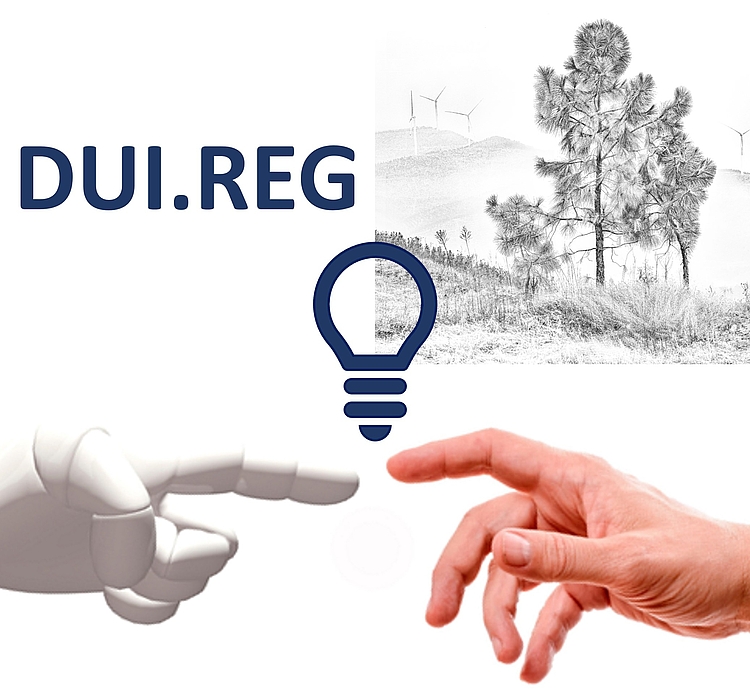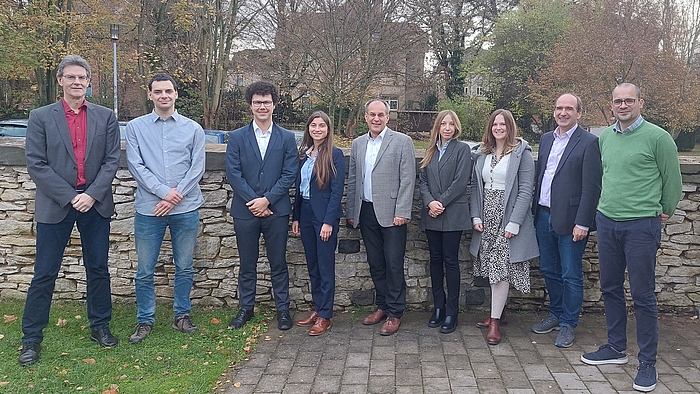DUI.REG - Measurement of the Doing-Using-Interacting mode of SMEs in structurally weak regions

| Led by: | Prof. Dr. Rolf Sternberg (LuH), Prof. Dr. Kilian Bizer (University of Göttingen), Prof. Dr. Uwe Cantner (University of Jena), Dr. Jörg Thomä (Institute for Small Business Economics at the University of Göttingen [ifh Göttingen]) |
| Team: | Anne-Sophie Kagel (LUH), Christoph Friedrich (LUH), Leonie Reher (University of Göttingen), Tobias Hädrich (University of Jena), Martina Buratti (University of Jena) |
| Year: | 2022 |
| Funding: | Federal Ministry of Education and Research (BMBF) in line of the funding action “WIR! - Change through innovation in the region" |
| Duration: | 2022 - 2025 |
Alongside technological change, innovations are one of the main drivers of economic growth. Therefore, innovation activities at regional, national and global levels are of central importance. The recording of learning processes in companies, which make innovations possible in the first place, has been an urgent task for innovation research for decades. These processes can take place in many different ways. Especially in structurally weak peripheral regions, small and medium-sized enterprises (SMEs) produce a large part of the innovations, although they have little or no research and development (R&D) activities based on the “Science-Technology-Innovation” (STI) mode. Rather, they act in the informal "Doing, Using and Interacting" (DUI) innovation mode. The question of how specific innovation policy recommendations can be based on the measurement of informal innovation activities by SMEs in peripheral regions is the subject of the new interdisciplinary research project "DUI.REG - Measurement of the Doing-Using-Interacting-Mode of SMEs in structurally weak regions".
In innovation research, the established measurement models primarily record activities that related to the STI mode. Indicators such as R&D expenditures, the number of patents and scientific publications of a company or its proportion of highly qualified employees are used to measure innovation activity. The literature on the STI and DUI modes in particular has been pointing out the lack of DUI-relevant innovation activities in quantitative studies for more than a decade. However, to our knowledge, no specific indicators for DUI-relevant learning processes have been applied on a larger empirical scale. This one-sided data basis is also reflected in German research and innovation policy, which primarily focuses on the (STI) mode in the German economy and tends to neglect the perspective of SMEs in structurally weak peripheral regions.
The overall goal of DUI.REG is to provide indicators for measuring innovation activities in the area of the DUI mode in order to use this data as a basis to develop tailor-made innovation policy measures for innovation and learning processes in DUI-oriented SMEs in peripheral regions. Here, DUI.REG transfers the set of indicators developed in the previous InDUI project to structurally weak regions in a quantitative survey. DUI.REG is a joint project, under the direction of Prof. Dr. Sternberg, Anne-Sophie Kagel (M.A.) and Christoph Friedrich (M.A.) work for the Department of Economic Geography at Leibniz Universität Hannover. The other partners are the Chair of Microeconomics at the University of Jena under the direction of Prof. Dr. Uwe Cantner, the professorship for economic policy and SME research at the University of Göttingen under the direction of Prof. Dr. Kilian Bizer and the Institute for Small Business Economics at the University of Göttingen (ifh Göttingen) under the direction of Dr. Jörg Thomä.
The task of the research team from the department of economic geography at Leibniz Universität Hannover is the qualitative contextualization of the survey data. In this way, the influence of spatially embedded learning processes, regionally specific conditions and development paths as well as the institutional and technological characteristics of the respective regions should be examined. The aim of the sub-project is to analyze how the SMEs in the examined regions perceive their respective environment with regard to the innovation conditions.
DUI.REG is part of the “WIR! - Change through innovation in the region", which itself is part of the "Innovation & Structural Change" program. WIR! primarily promotes projects in regions that have not yet developed any innovation profiles that are visible at a national level, in order to leverage their unused innovation potential.
Publications
- Friedrich, C.; Kagel, A.-S. (2025): STI and DUI modes of innovation in poorly developed RIS: Systemic failures and challenges. European Planning Studies 33(2), 245-263. DOI: 10.1080/09654313.2024.2430240
- Sternberg, R. (2023): Wissenstransfer und regionale Innovationssysteme. In: Lange, J., Bizer, K., Führ, M., Hirschmann, D., Horstmann, E., Winkler-Portmann, S.J. (Hg.): Regionaler Wissenstransfer für Nachhaltige Entwicklung. Loccum: Evangelische Akademie Loccum, 9–24.
- Friedrich, C.; Sternberg, R. (2023): Regionale Innovationspolitiken zugunsten strukturschwacher Regionen Deutschlands. ifh Forschungsbericht 9, Göttingen: Volkswirtschaftliches Institut für Mittelstand & Handwerk an der Universität Göttingen. DOI: 10.47952/gro-publ-124
Presentations to Scientific Audiences
- Sternberg, R.; Friedrich, C.; Kagel, A.: The regional context of innovation processes of SMEs in lagging regions: empirical evidence and implications for innovation policy. Research Conference on "Doing, Using and Interacting – Innovation in Lagging Regions". Göttingen, 21.11.2024.
- Sternberg, R.; Friedrich, C.; Kagel, A.: Innovationskontext strukturschwacher Regionen. Tagung "Innovationspolitik in strukturschwachen Regionen", Evangelische Akademie Loccum Loccum, 24.09.2024.
- Friedrich, C.: Combinatorial knowledge bases in Entrepreneurship: differences between startups and incumbents in German regions. IIDEOS Colloquium. Marburg 17.07.2024.
- Friedrich, C.: Regional innovation policies in favour of lagging regions in Germany. IIDEOS Colloquium, Marburg, 20.02.2024
- Friedrich, C.; Sternberg, R.: Regional Innovation Policies in Germany in Favour of Structurally Weak Regions. 7th Geography of Innovation Conference, University of Manchester. Manchester/UK, 12.01.2024.
- Kagel, A.; Haefner, L.: Digitalization in the Periphery - A Promising Opportunity for Economic Renewal? 7th Geography of Innovation Conference. Manchester, 11.01.2024.
- Friedrich, C.: STI and DUI modes of innovation in peripheral regions: Systemic failures and challenges in different types of poorly developed RIS, AK Industriegeographie. Naurod-Niedernhausen, 25.11.2022.
- Sternberg, R.: Regionsspezifische Kontextualisierung von DUI-Innovationen mittels qualitativer Primärdaten. Treffen des Beirats des Forschungsvorhabens „DUI.REG - Messung des Doing-Using-Interacting-Modus von KMU in strukturschwachen Regionen“. Göttingen 22.11.2022.
- Sternberg, R.: Wissenstransfer und Regionale Innovationssysteme. Tagung "Regionaler Wissenstransfer für Nachhaltige Entwicklung?", Evangelische Akademie Loccum. Loccum 28.09.2022.
- Friedrich, C.: STI and DUI modes of innovation in peripheral regions. Systemic failures and challenges in different types of poorly developed RIS, DUI.REG Project Meeting, Friedrich-Schiller-Universität Jena, 08.07.2022.
- Bizer, K.; Cantner, U.; Sternberg, R.; Thomä, J.: How to measure the unknown? A new approach to analyze the DUI mode of innovation in structurally weak regions and related policies. Eu-SPRI 2022 Conference "Challenging Science and Innovation Policy". Utrecht (Niederlande) 13.06.2022.


 ©
Bäumle, P, 2022
©
Bäumle, P, 2022


